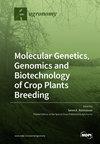Antioxidant Responses of Water-Stressed Cherry Tomato Plants to Natural Biostimulants
IF 3.3
2区 农林科学
Q1 AGRONOMY
引用次数: 0
Abstract
Biostimulants’ application to plants can reduce the damage caused by abiotic factors such as drought or salinity and improve crop yield under these stressful conditions. In this work, several biostimulants, namely Terrabion Aminovit® (a commercial product based on amino acids), potassium fulvate, humic acids, and a seaweed extract, were applied to cherry tomato plants using fertigation at two doses of 0.2 and 1.0 g L−1. The plants were then subjected to a water stress treatment by completely withholding irrigation for 12 days. After the treatments, all plants were harvested to determine several growth and biochemical parameters. Pre-treatment with all biostimulants protected the tomato plants against dehydration, as indicated by a significant increase in leaf water content compared to the non-irrigated controls. Leaf fresh weight and root water content also increased, except in the plants treated with humic acids, by about 2 fold in plants pre-treated with Terrabion Aminovit® and 1.5 fold in the presence of potassium fulvate and the seaweed extract. The water stress treatment caused a significant increase in leaf proline content, up to 113.6 μmol g−1 DW, approximately 18 fold higher than in well-irrigated control plants; this value was significantly lower in Terrabion Aminovit® pre-treated plants but even higher, ca. 180 μmol g−1 DW, in those treated previously with the seaweed extract. These results indicate that proline is a suitable water stress biomarker in tomatoes and that the biostimulants probably differ in their mode of action, suggesting that the effect of the seaweed extract is mediated by proline accumulation. A significant activation of antioxidant enzymes, namely superoxide dismutase, ascorbate peroxidase, and glutathione reductase, was also observed in water-stressed plants; application of the biostimulants resulted in all cases, in a significant reduction in the specific activities of the three enzymes, indicating reduced levels of drought-induced oxidative stress in the plants. We conclude that applying these biostimulants, particularly Terrabion Aminovit®, may help minimise the adverse effects of water stress on tomatoes by maintaining turgor and improving growth through mechanisms still unknown but which appear to involve, at least in part, enhancing the plants’ antioxidant defence responses.水分胁迫下樱桃番茄植株对天然生物刺激物的抗氧化反应
在植物上施用生物刺激剂可以减少干旱或盐碱等非生物因素造成的损害,并在这些胁迫条件下提高作物产量。在这项工作中,几种生物刺激剂,即Terrabion Aminovit®(一种基于氨基酸的商业产品)、黄酸钾、腐植酸和海藻提取物,以0.2和1.0 g L−1的两种剂量施用于樱桃番茄植株。然后对植株进行水分胁迫处理,完全不灌溉12天。处理结束后,采集所有植株,测定其生长和生化参数。与未灌溉对照相比,叶片含水量显著增加表明,所有生物刺激剂的预处理保护了番茄植株免受脱水。除腐植酸处理外,叶片鲜重和根含水量也增加了约2倍于Terrabion Aminovit®预处理的植物,1.5倍于黄酸钾和海藻提取物。水分胁迫处理显著提高了叶片脯氨酸含量,最高可达113.6 μmol g−1 DW,约为灌水对照植株的18倍;在Terrabion Aminovit®预处理的植物中,该值显着降低,但在先前用海藻提取物处理的植物中,该值更高,约为180 μmol g−1 DW。这些结果表明,脯氨酸是番茄中合适的水分胁迫生物标志物,而这些生物刺激剂的作用方式可能不同,这表明海藻提取物的作用是通过脯氨酸积累介导的。抗氧化酶,即超氧化物歧化酶、抗坏血酸过氧化物酶和谷胱甘肽还原酶,在缺水植物中也有显著的活化;在所有情况下,应用生物刺激剂导致三种酶的特定活性显著降低,表明植物中干旱诱导的氧化应激水平降低。我们的结论是,使用这些生物刺激剂,特别是Terrabion Aminovit®,可能有助于减少水分胁迫对番茄的不利影响,其机制尚不清楚,但似乎至少部分涉及增强植物的抗氧化防御反应。
本文章由计算机程序翻译,如有差异,请以英文原文为准。
求助全文
约1分钟内获得全文
求助全文
来源期刊

Agronomy-Basel
Agricultural and Biological Sciences-Agronomy and Crop Science
CiteScore
6.20
自引率
13.50%
发文量
2665
审稿时长
20.32 days
期刊介绍:
Agronomy (ISSN 2073-4395) is an international and cross-disciplinary scholarly journal on agronomy and agroecology. It publishes reviews, regular research papers, communications and short notes, and there is no restriction on the length of the papers. Our aim is to encourage scientists to publish their experimental and theoretical research in as much detail as possible. Full experimental and/or methodical details must be provided for research articles.
 求助内容:
求助内容: 应助结果提醒方式:
应助结果提醒方式:


